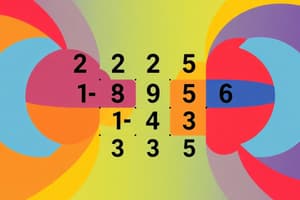Podcast
Questions and Answers
What distinguishes a teacher's philosophy of teaching and learning from their philosophy of mathematics?
What distinguishes a teacher's philosophy of teaching and learning from their philosophy of mathematics?
- Philosophy of teaching focuses solely on pedagogical methods.
- Philosophy of teaching emphasizes social interaction in learning.
- Philosophy of mathematics is independent of instructional strategies. (correct)
- Philosophy of mathematics concerns beliefs about knowledge acquisition. (correct)
Which of the following is NOT one of the five process standards described by NCTM?
Which of the following is NOT one of the five process standards described by NCTM?
- Problem solving
- Communication
- Reasoning and proof
- Creativity (correct)
How does a teacher with a fallibilist view perceive mathematics?
How does a teacher with a fallibilist view perceive mathematics?
- As a socially constructed and tentative discipline (correct)
- As a collection of procedures to be memorized
- As a process-oriented teaching strategy
- As an absolute and unchanging discipline
What is one criticism of teaching mathematics as a human construct?
What is one criticism of teaching mathematics as a human construct?
In the example conversation among third graders, what incorrect conjecture is made?
In the example conversation among third graders, what incorrect conjecture is made?
What do many adults mistakenly imply when they claim multiplication always results in a larger number?
What do many adults mistakenly imply when they claim multiplication always results in a larger number?
What is a potential limitation of third graders' understanding of multiplication, according to the conversation?
What is a potential limitation of third graders' understanding of multiplication, according to the conversation?
How does the concept of multiplication relate to the exploration of mathematical knowledge?
How does the concept of multiplication relate to the exploration of mathematical knowledge?
What do fallibilists support in the field of mathematics education?
What do fallibilists support in the field of mathematics education?
What is a key reason for the failure of the child's conjecture?
What is a key reason for the failure of the child's conjecture?
Which statement best reflects the nature of mathematics according to the provided content?
Which statement best reflects the nature of mathematics according to the provided content?
What aspect of mathematics education is considered neglected in research?
What aspect of mathematics education is considered neglected in research?
What do fallibilist and absolutist philosophies in mathematics represent?
What do fallibilist and absolutist philosophies in mathematics represent?
What question is posed regarding teachers' understanding of mathematics?
What question is posed regarding teachers' understanding of mathematics?
What is required for sustainable reform in mathematics education?
What is required for sustainable reform in mathematics education?
What do researchers typically overlook in the field of mathematics education?
What do researchers typically overlook in the field of mathematics education?
Why is reasoning in mathematics considered more complex than procedural knowledge?
Why is reasoning in mathematics considered more complex than procedural knowledge?
What is the primary goal when engaging students in problem-solving tasks according to the passage?
What is the primary goal when engaging students in problem-solving tasks according to the passage?
What misconception did teachers have regarding contextually-based problems?
What misconception did teachers have regarding contextually-based problems?
What role do axioms play in pure mathematics?
What role do axioms play in pure mathematics?
What did mathematicians begin to question in the nineteenth century regarding Euclid's postulates?
What did mathematicians begin to question in the nineteenth century regarding Euclid's postulates?
How did the teachers rank the difficulty of contextually-based problems compared to purely algebraic ones?
How did the teachers rank the difficulty of contextually-based problems compared to purely algebraic ones?
What is a key characteristic of Non-Euclidean geometries?
What is a key characteristic of Non-Euclidean geometries?
What has research shown about the relationship between reasoning and performance on assessments?
What has research shown about the relationship between reasoning and performance on assessments?
How can students better understand the tentative nature of mathematics?
How can students better understand the tentative nature of mathematics?
Which sequence best describes students' progression in understanding number systems?
Which sequence best describes students' progression in understanding number systems?
What role does reasoning play in solving contextually-based problems?
What role does reasoning play in solving contextually-based problems?
What did the van Hiele levels describe?
What did the van Hiele levels describe?
Why is it important for K-12 students to understand assumptions in mathematics?
Why is it important for K-12 students to understand assumptions in mathematics?
What is a common outcome of questioning mathematical assumptions?
What is a common outcome of questioning mathematical assumptions?
What was one consequence of the introduction of irrational numbers among the ancient Greeks?
What was one consequence of the introduction of irrational numbers among the ancient Greeks?
What traditional viewpoint about mathematics does the content criticize?
What traditional viewpoint about mathematics does the content criticize?
What is one consequence of strictly mimicking procedures in a mathematics classroom?
What is one consequence of strictly mimicking procedures in a mathematics classroom?
How is creativity regarded by an absolutist's perspective on mathematics?
How is creativity regarded by an absolutist's perspective on mathematics?
What outcome can true problem-solving experiences foster in students?
What outcome can true problem-solving experiences foster in students?
Flashcards
Absolutist Philosophy of Mathematics
Absolutist Philosophy of Mathematics
The belief that mathematical knowledge is absolute, fixed, and unchanging. It's often associated with traditional approaches focused on procedures and rules.
Fallibilist Philosophy of Mathematics
Fallibilist Philosophy of Mathematics
The belief that mathematical knowledge is constantly evolving, subject to change, and influenced by social and historical contexts.
Mathematical Practices
Mathematical Practices
A set of skills and processes that students should develop when engaging with mathematics, such as problem-solving, reasoning, and communication.
Curriculum Frameworks
Curriculum Frameworks
Signup and view all the flashcards
Understanding the Nature of Mathematics
Understanding the Nature of Mathematics
Signup and view all the flashcards
Fallibilism in mathematics
Fallibilism in mathematics
Signup and view all the flashcards
Absolutism in mathematics
Absolutism in mathematics
Signup and view all the flashcards
Impact of philosophy on math education
Impact of philosophy on math education
Signup and view all the flashcards
Teacher's unawareness of math philosophy
Teacher's unawareness of math philosophy
Signup and view all the flashcards
Continuum of math philosophies
Continuum of math philosophies
Signup and view all the flashcards
Importance of teachers' math philosophy
Importance of teachers' math philosophy
Signup and view all the flashcards
Lakatos' view on mathematical exploration
Lakatos' view on mathematical exploration
Signup and view all the flashcards
Mathematical conjecture
Mathematical conjecture
Signup and view all the flashcards
Fallibilism
Fallibilism
Signup and view all the flashcards
Social Construction of Reality
Social Construction of Reality
Signup and view all the flashcards
Social Theories of Knowledge
Social Theories of Knowledge
Signup and view all the flashcards
Mathematics as a Human Construct
Mathematics as a Human Construct
Signup and view all the flashcards
Mathematical Theorem
Mathematical Theorem
Signup and view all the flashcards
Mathematical Inquiry
Mathematical Inquiry
Signup and view all the flashcards
Critical Thinking in Mathematics
Critical Thinking in Mathematics
Signup and view all the flashcards
Mathematical reasoning
Mathematical reasoning
Signup and view all the flashcards
Reasoning vs. Procedures
Reasoning vs. Procedures
Signup and view all the flashcards
Reasoning Performance
Reasoning Performance
Signup and view all the flashcards
Fallibilist perspective
Fallibilist perspective
Signup and view all the flashcards
Explicit Reasoning
Explicit Reasoning
Signup and view all the flashcards
Procedural Knowledge vs. Reasoning
Procedural Knowledge vs. Reasoning
Signup and view all the flashcards
Contextual Problems
Contextual Problems
Signup and view all the flashcards
Contextual Problem Solving
Contextual Problem Solving
Signup and view all the flashcards
Axioms in mathematics
Axioms in mathematics
Signup and view all the flashcards
Tentative nature of mathematics
Tentative nature of mathematics
Signup and view all the flashcards
Hyperbolic and Elliptic Geometries
Hyperbolic and Elliptic Geometries
Signup and view all the flashcards
Van Hiele Levels of Geometric Thinking
Van Hiele Levels of Geometric Thinking
Signup and view all the flashcards
Mathematical Modeling
Mathematical Modeling
Signup and view all the flashcards
Evolution of Number Systems
Evolution of Number Systems
Signup and view all the flashcards
Unit Fractions
Unit Fractions
Signup and view all the flashcards
Teaching the Tentative Nature of Mathematics
Teaching the Tentative Nature of Mathematics
Signup and view all the flashcards
Rough-draft talk
Rough-draft talk
Signup and view all the flashcards
Absolutist view of mathematics
Absolutist view of mathematics
Signup and view all the flashcards
Fallibilist view of mathematics
Fallibilist view of mathematics
Signup and view all the flashcards
Creativity in mathematics
Creativity in mathematics
Signup and view all the flashcards
True problem-solving in math
True problem-solving in math
Signup and view all the flashcards
Exploration of ideas in mathematics
Exploration of ideas in mathematics
Signup and view all the flashcards
Nature of mathematics
Nature of mathematics
Signup and view all the flashcards
Study Notes
Chapter 4: The Nature of Mathematics and Its Impact on K-12 Education
- Mathematics is a subject of debate and controversy, both among mathematicians and the general public.
- The content of mathematics is accepted as a crucial component of K-12 education, however, the nature of mathematics taught is not well defined.
- Student experiences with learning mathematical concepts vary significantly impacting their understanding and perception of the subject.
- Students often perceive mathematics as a set of rules and numbers, while mathematicians tend to see it as a study of patterns.
- Pure mathematics focuses on the subject itself, whereas applied mathematics seeks real-world applications.
- Absolutist views consider mathematical knowledge as certain and unchallengeable, emphasizing concepts as having always existed and simply being discovered.
- Fallibilist views contend that mathematical knowledge is a human construct, subject to potential falsifiability, and influenced by cultural factors.
- The traditional method of teaching mathematics often emphasizes procedural knowledge without allowing for creative problem-solving.
- Creative problem-solving is a critical component of mathematics and should be promoted in education.
- Traditional mathematics education may limit opportunities for students' problem-solving abilities.
- Mathematical understanding is often better developed through problem-solving that encourages students to develop their own reasoning.
- Current mathematics education should reflect the tentative nature of mathematical knowledge which is characterized by assumptions, testing and potential revision as in proof.
- Students should learn about the context-dependency, subjectivity and continual discovery inherent in mathematics.
Philosophical Underpinnings
- Absolutist perspective views mathematics as a fixed set of rules and procedures.
- Fallibilist perspective views mathematics as ever-evolving and tentative.
- The nature of mathematics is taught differently based on the philosophy behind the approach.
- Teachers' philosophical viewpoints affect the strategies employed for teaching mathematics.
What K-12 Students Should Know About the Nature of Mathematics
- Students should understand mathematics as a way of reasoning by using procedures and practices.
- The processes include problem-solving, reasoning, communication, connections and representations.
- Curriculum documents in various countries emphasize these skills.
- These processes are integrated into curriculum documents in several countries like Australia and Singapore.
- Students should realize that mathematics is both creative and tentative, emphasizing that it is continually under development.
- Creative problem-solving plays a crucial role in understanding the nature of mathematics.
- The tentative nature of mathematics requires an understanding that assumptions can be questioned and re-evaluated.
Studying That Suits You
Use AI to generate personalized quizzes and flashcards to suit your learning preferences.




